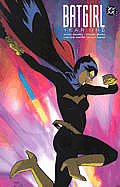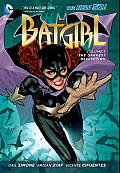The Economics of Oracle and Batgirl
Two weeks ago I wrote about how we can interpret certain heroes of the 1986-2011 DC Universe—Wally West, Cassandra Cain, and Stephanie Brown—as having successfully come of age.
In rebooting its universe, DC made most of its characters younger. If the company had returned those three to their original status as young heroes struggling under their elders’ shadows and other burdens, that would erase their hard-won achievements and disappoint their biggest fans.
But then I asked, “Why doesn’t the same logic apply to Dick Grayson, Tim Drake, and Barbara Gordon?” Comics readers have seen all of them grow up along their intersecting paths:
The first factor in this restoration of the status quo ante is simply economics. Versions of all three characters were featured in the Batman television series, live and animated. Many more people saw those stories than were reading the last two decades of comic books.
That factor seems to be most influential in the case of Barbara Gordon. Originally created at the instigation of the Batman television producers, her initial conflict was trying to keep up with the Dynamic Duo while hiding her masked crime-fighting from her father, Police Commissioner Gordon. For a while she was a US Congresswoman (with Dick Grayson as a young aide and eager romantic interest). That suggested she had indeed come of age.
Not knowing where to take Barbara after that (and with Dick romancing Koriand’r in New Teen Titans), DC Comics benched her in the 1980s. Then the company approved Alan Moore’s proposal to have the Joker shoot and paralyze her in Batman: The Killing Joke (1988).
Subsequently Kim Yale and John Ostrander, an editor-writer team and couple, developed a new role for Barbara Gordon: as Oracle, mysterious computer mastermind, online investigator, and super-police dispatcher. In comics like Suicide Squad, Batman: Gotham Knights, Birds of Prey, Justice League, and two Batgirl series starring younger teen protégées, Oracle pulled strings throughout the DC Universe. Her physical disability coupled with online mobility both reflected her past and personality and produced an unresolvable foundational conflict that generated stories.
But Oracle’s networking was tied into the complexity of that DC Universe, and the company feared that complexity was scaring off new readers. And, as I wrote above, millions of TV viewers knew Barbara Gordon as Batgirl. So back she came.
For the new universe, DC didn’t erase Barbara’s past as Oracle, paraplegic computer jock. But it did shorten that period to about three years, delete the Birds of Prey team she created, and completely restore her athleticism. Those changes rendered her work as Oracle far less important. Writer Gail Simone is exploring the psychological trauma of the Joker’s attack, and that may become part of the character’s new foundational conflict. But for many readers Barbara had already overcome that trauma by remaking herself as Oracle.
As well reviewed as Simone’s stories are, the removal of the 1986-2011 continuity’s Oracle does seem like an unreplaced loss and a disappointment. There was still a lot of story potential in the character’s previous situation.
However, the most recent sales figures (for May 2012) show DC selling nearly 59,000 copies of Batgirl through the Diamond wholesaler while the sales of the last issue starring Stephanie Brown (from August 2011) were below 23,000. It would be hard to convince the publisher that it had made a mistake when sales are up over 250%.
COMING UP: And Tim and Dick? This is the weekly Robin, after all.
In rebooting its universe, DC made most of its characters younger. If the company had returned those three to their original status as young heroes struggling under their elders’ shadows and other burdens, that would erase their hard-won achievements and disappoint their biggest fans.
But then I asked, “Why doesn’t the same logic apply to Dick Grayson, Tim Drake, and Barbara Gordon?” Comics readers have seen all of them grow up along their intersecting paths:
- Dick as Robin, Nightwing, Batman briefly, Nightwing again, and finally Batman, evidently to stay.
- Tim as Robin and then Red Robin.
- Barbara as Batgirl and then Oracle.
The first factor in this restoration of the status quo ante is simply economics. Versions of all three characters were featured in the Batman television series, live and animated. Many more people saw those stories than were reading the last two decades of comic books.
That factor seems to be most influential in the case of Barbara Gordon. Originally created at the instigation of the Batman television producers, her initial conflict was trying to keep up with the Dynamic Duo while hiding her masked crime-fighting from her father, Police Commissioner Gordon. For a while she was a US Congresswoman (with Dick Grayson as a young aide and eager romantic interest). That suggested she had indeed come of age.
Not knowing where to take Barbara after that (and with Dick romancing Koriand’r in New Teen Titans), DC Comics benched her in the 1980s. Then the company approved Alan Moore’s proposal to have the Joker shoot and paralyze her in Batman: The Killing Joke (1988).
Subsequently Kim Yale and John Ostrander, an editor-writer team and couple, developed a new role for Barbara Gordon: as Oracle, mysterious computer mastermind, online investigator, and super-police dispatcher. In comics like Suicide Squad, Batman: Gotham Knights, Birds of Prey, Justice League, and two Batgirl series starring younger teen protégées, Oracle pulled strings throughout the DC Universe. Her physical disability coupled with online mobility both reflected her past and personality and produced an unresolvable foundational conflict that generated stories.
But Oracle’s networking was tied into the complexity of that DC Universe, and the company feared that complexity was scaring off new readers. And, as I wrote above, millions of TV viewers knew Barbara Gordon as Batgirl. So back she came.
For the new universe, DC didn’t erase Barbara’s past as Oracle, paraplegic computer jock. But it did shorten that period to about three years, delete the Birds of Prey team she created, and completely restore her athleticism. Those changes rendered her work as Oracle far less important. Writer Gail Simone is exploring the psychological trauma of the Joker’s attack, and that may become part of the character’s new foundational conflict. But for many readers Barbara had already overcome that trauma by remaking herself as Oracle.
As well reviewed as Simone’s stories are, the removal of the 1986-2011 continuity’s Oracle does seem like an unreplaced loss and a disappointment. There was still a lot of story potential in the character’s previous situation.
However, the most recent sales figures (for May 2012) show DC selling nearly 59,000 copies of Batgirl through the Diamond wholesaler while the sales of the last issue starring Stephanie Brown (from August 2011) were below 23,000. It would be hard to convince the publisher that it had made a mistake when sales are up over 250%.
COMING UP: And Tim and Dick? This is the weekly Robin, after all.





2 comments:
Has it actually been confirmed that Barbara has any career as Oracle in the new DCU history? I don't think I've seen it referenced directly.
Around the launch of the new continuity, DC editors said that its version of Barbara Gordon “was Oracle.” Of course, the company could have changed its corporate mind. (It seems to do that a lot.) But the lack of any stories derived from that part of the character's past shows how little importance it seems to hold.
Post a Comment